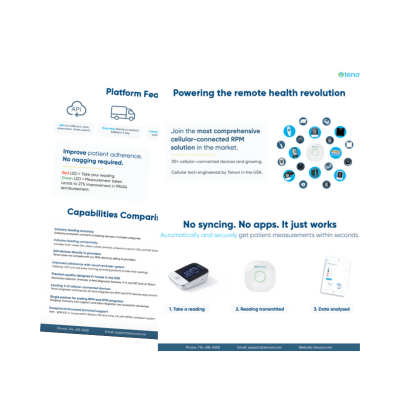Medication adherence tracking is key to managing chronic conditions like musculoskeletal (MSK) and respiratory disorders. Ensuring patients follow their prescribed medication regimens helps prevent disease progression, reduce hospitalizations, and improve overall health outcomes.
In this article, we examine remote therapeutic monitoring (RTM), how it is used for medication adherence tracking musculoskeletal (MSK) and respiratory conditions, and how RTM reimbursement works. Additionally, we discuss the cellular-connected Tenovi Pillbox and the musculoskeletal and respiratory medications it is designed to support.
RTM and Medication Adherence Tracking
Remote therapeutic monitoring helps physicians and patients manage their treatment plans for musculoskeletal and respiratory conditions as well as behavioral health conditions. With RTM, patients will use FDA-cleared medical devices that collect non-physiological data, such as signs and symptoms, how well the treatment works, and overall patient status. This includes medical devices that serve as medication adherence tools, like the Tenovi Pillbox.
The Tenovi Pillbox looks like a standard pill box, but it detects when a patient opens or refills a pill compartment and provides a visual reminder for the patient that it’s time to take their medication. When the pillbox is opened or refilled, data from the pillbox is automatically and securely transmitted through the Tenovi Cellular Gateway. From there, the data is sent to the Tenovi cloud. APIs can send data to preferred RTM care or provider platforms and for fulfillment services.
RTM Billing: Musculoskeletal and Respiratory
The Centers for Medicare & Medicaid Services (CMS) has recognized the importance of medication adherence tracking in managing chronic conditions and introduced specific billing codes for remote therapeutic monitoring. These codes allow healthcare providers to be reimbursed for monitoring patients using devices like the Tenovi Pillbox, which tracks non-physiological data related to medication adherence.
Medical devices that collect non-physiological data for patients and allow healthcare providers to bill Medicare for musculoskeletal conditions under remote therapeutic monitoring CPT 98977 and respiratory under CPT 98976. CMS billing requirements stipulate that the patient must use the RTM device to monitor at least 16 days of data per each 30-day period.
One practitioner can only bill for RTM CPT codes 98975, 98976, 98977, and 98978 during a 30-day period when at least 16 days of data have been collected on at least one RTM medical device.
RTM codes cannot be combined with the RPM codes. In addition, when a more specific code is available to describe a service, the more specific code should be billed.
CPT 98976 for Respiratory Conditions
RTM billing for respiratory conditions is supported by CPT code 98976. This code is used for RTM involving medications for respiratory conditions such as asthma, COPD, or bronchitis. Healthcare providers can bill for tracking patient medication adherence to medications such as bronchodilators and inhaled corticosteroids through the Tenovi Pillbox.
CPT 98977 for Musculoskeletal Conditions
RTM billing for musculoskeletal conditions is supported by CPT code 98977. This code covers data transmission related to tracking medication adherence for patients with MSK disorders, such as arthritis or post-surgical rehabilitation. Providers can use this code when the Tenovi Pillbox monitors medications like Non-steroidal anti-inflammatory drugs (NSAIDs) or disease-modifying antirheumatic drugs (DMARDs).
Codes 98980 and 98981
CPT codes 98980 and 98981 are available for remote therapeutic monitoring treatment management services. These can be billed when qualified healthcare professionals spend at least 20 minutes in a given month managing a patient’s RTM data, including at least one interactive communication session with the patient.
More updates and changes to CMS billing requirements for RTM are expected in the CMS final rule scheduled for release in November 2024.
Tenovi PillBox: Which Medications Are Compatible?
The Tenovi Pillbox supports several medications commonly prescribed for musculoskeletal and respiratory conditions, making it an ideal tool for RTM and medication adherence tracking.
MSK Medications
For musculoskeletal conditions, the following medications are compatible:
- Non-steroidal anti-inflammatory Drugs (NSAIDs): Naproxen, Diclofenac, Celecoxib, Aspirin
- Analgesics: Acetaminophen, Paracetamol
- Muscle relaxants: Cyclobenzaprine, Baclofen, Methocarbamol, Tizanidine, Carisoprodol
- Corticosteroids: Prednisone, Methylprednisolone, Dexamethasone, Hydrocortisone
- Disease-modifying anti-rheumatic drugs (DMARDs): Methotrexate, Hydroxychloroquine, Sulfasalazine, Leflunomide
- Biologic agents: Infliximab, Etanercept
- Topical analgesics: Capsaicin cream, Diclofenac gel
- Opioids: Oxycodone, Hydrocodone
- Bisphosphonates: Alendronate
Respiratory Medications
For respiratory conditions, the following medications are compatible:
- Bronchodilators: Albuterol, Salmeterol
- Inhaled corticosteroids: Fluticasone, Budesonide
- Leukotriene modifiers: Montelukast
- Anticholinergics: Ipratropium, Tiotropium
- Expectorants: Guaifenesin
- Antitussives: Dextromethorphan
- Antihistamines: Diphenhydramine, Loratadine
- Decongestants: Pseudoephedrine
- Antibiotics (for bacterial respiratory infections): Amoxicillin, Azithromycin
- Mucolytics: Acetylcysteine
- Monoclonal antibodies: Omalizumab, Dupilumab
These lists include many common medications available for musculoskeletal and respiratory conditions. There may be generic or branded versions for each. Always check with a healthcare provider for specific recommendations and availability.
The Tenovi Pillbox
The Tenovi Pillbox is a smart pillbox that offers advanced features that make medication adherence tracking seamless and efficient for patients managing musculoskeletal and respiratory conditions.
- Automatic Detection: 14 compartments that automatically detect when pills are taken or refilled, removing the need for manual logging or nagging reminders.
- Cellular Connectivity: Unlike other smart pillboxes that rely on Wi-Fi or apps, the Tenovi Pillbox uses cellular technology to transmit data, making it accessible for patients who may not be tech-savvy or do not have internet access.
- RTM Billing: Integrates with RTM billing CPT 98976 and 98977, automating data transmission and visual reminders for patients.
- Easy Setup: No charging the pillbox or installing apps is needed. It functions like a standard 7-day pillbox but with the added advantage of RTM and medication adherence tracking.
Understanding RTM and Medication Adherence Tracking
The CMS final rule in November 2024 will further clarify CPT code billing requirements for RTM and medication adherence tracking. Visit the Tenovi Blog to stay updated on these developments and reference guides to maximize your understanding of RTM devices and services to help improve patient outcomes. Schedule a free demo to learn more about the Tenovi Pillbox works.


